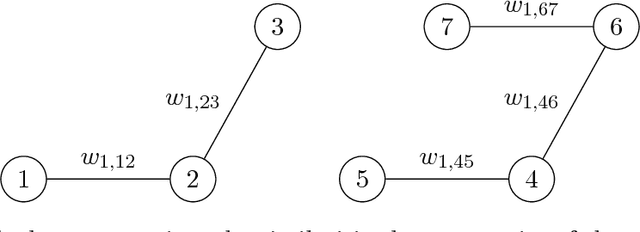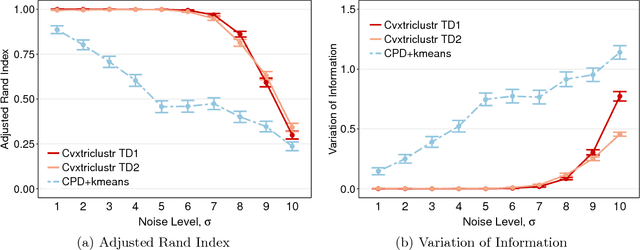Brian R. Gaines
Provable Convex Co-clustering of Tensors
Mar 17, 2018



Abstract:Cluster analysis is a fundamental tool for pattern discovery of complex heterogeneous data. Prevalent clustering methods mainly focus on vector or matrix-variate data and are not applicable to general-order tensors, which arise frequently in modern scientific and business applications. Moreover, there is a gap between statistical guarantees and computational efficiency for existing tensor clustering solutions due to the nature of their non-convex formulations. In this work, we bridge this gap by developing a provable convex formulation of tensor co-clustering. Our convex co-clustering (CoCo) estimator enjoys stability guarantees and is both computationally and storage efficient. We further establish a non-asymptotic error bound for the CoCo estimator, which reveals a surprising "blessing of dimensionality" phenomenon that does not exist in vector or matrix-variate cluster analysis. Our theoretical findings are supported by extensive simulated studies. Finally, we apply the CoCo estimator to the cluster analysis of advertisement click tensor data from a major online company. Our clustering results provide meaningful business insights to improve advertising effectiveness.
Algorithms for Fitting the Constrained Lasso
Oct 28, 2016



Abstract:We compare alternative computing strategies for solving the constrained lasso problem. As its name suggests, the constrained lasso extends the widely-used lasso to handle linear constraints, which allow the user to incorporate prior information into the model. In addition to quadratic programming, we employ the alternating direction method of multipliers (ADMM) and also derive an efficient solution path algorithm. Through both simulations and real data examples, we compare the different algorithms and provide practical recommendations in terms of efficiency and accuracy for various sizes of data. We also show that, for an arbitrary penalty matrix, the generalized lasso can be transformed to a constrained lasso, while the converse is not true. Thus, our methods can also be used for estimating a generalized lasso, which has wide-ranging applications. Code for implementing the algorithms is freely available in the Matlab toolbox SparseReg.
 Add to Chrome
Add to Chrome Add to Firefox
Add to Firefox Add to Edge
Add to Edge